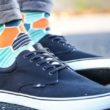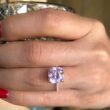Ethical Fashion and Accessories are Booming
Younger generations of consumers are no longer willing to dress fashionably at the expense of our Planet. The fashion industry causes up to 10% of global carbon emissions and 20% of the Planet’s wastewater. Approximately 35% of US consumers are willing to pay more for sustainable clothing. For millennials and Gen-Z’s, sustainability is such a big priority that they are simply no longer willing to keep backing companies without a regard for ethics and environmental responsibility. Read on to discover just a few of the top trends taking over the ethical fashion sector.

A Penchant for Sustainable Gemstones

Gemstones are notorious for leaving huge human and environmental costs in their wake, with diamonds, in particular, having earned a poor reputation that the Kimberley Process has sought to ameliorate. Today’s fine jewelry customers are a savvy group who insist on transparency, green mining and manufacturing processes, and fair conditions for workers. Ethical diamonds in particular are the order of the day, especially when it comes to weddings and other special occasions. If you wondered what the features of ethical diamonds were, take note. Tim Ingle of ethical jewellery specialists Ingle & Rhode says, “An ethical diamond is a diamond that has been produced without human exploitation and with due care for the environment. More than just conflict-free, ethical diamonds are mined with strict environmental safeguards in place by adults working in safe conditions and cut and polished by adults working with fair pay and conditions.”
Saving the Seas

Almost nine million tonnes of mismanaged plastic make their way into the world’s oceans annually. One of the most harmful types of plastic is discarded fishing nets, which kill over 650,000 marine animals every year. Savvy brands like Isbörn from Sweden are killing two birds with one stone, collecting fishing nets and manufacturing them into ultra-sturdy jackets that are meant to be worn by at least three people. Another brand that is doing its share to reduce plastic in oceans is Bureo from California. This company works alongside local fishing communities in South America to supplement their income while recycling collected plastic into NetPlusⓇ—a resilient product that is sold to a host of sustainable brands, including Patagonia.
Respecting Animal Welfare

Many trending brands (including Hug Boss, Nae, and Po-Zu) are manufacturing items in vegan leather. The latter is made from innovative materials like mycelium (the underground network that grows beneath mushrooms) and pineapple leaf fiber. Other brands (like Sheep Inc.) are aiming to connect customers with animals, assigning everyone who buys one of their items to one of their friendly sheep. The company goes the extra mile when it comes to improving the lives of animals, complying with a prestigious wool certification called ZQ. The latter requires companies to support animal welfare, feed animals well, allow them to graze freely on pastures, and live natural, pain-free lives.
The sustainable, ethical fashion industry has enjoyed a big surge in popularity over the past few years. Millennial and Gen-Z buyers are particularly keen on supporting companies that do something positive for our planet and for animals. Sustainable gemstones, recycled plastic fish nets, and vegan leather are just a few materials that designers are turning into beautiful designs that are meant to last a lifetime.





